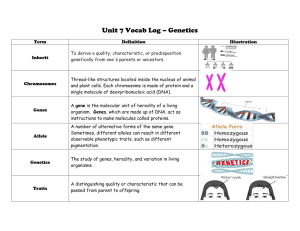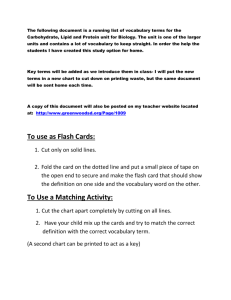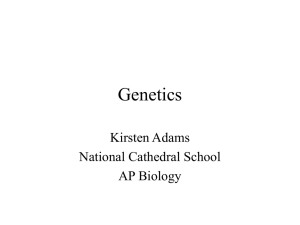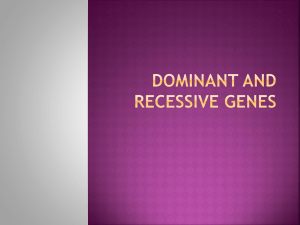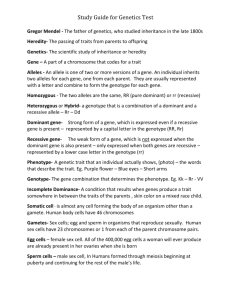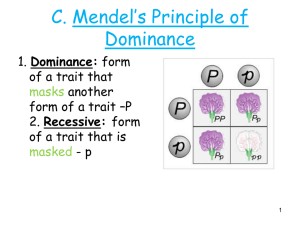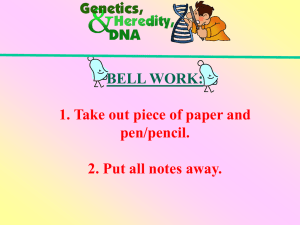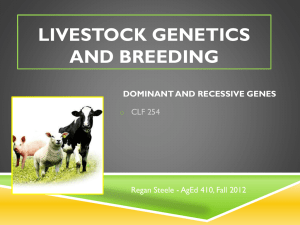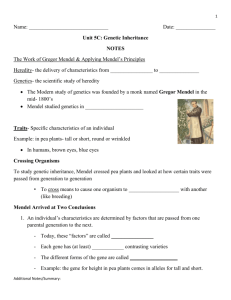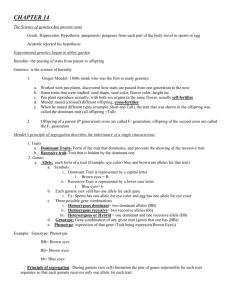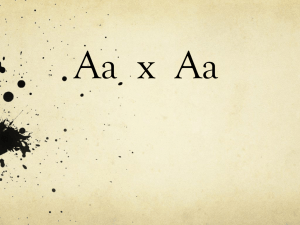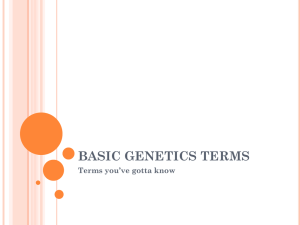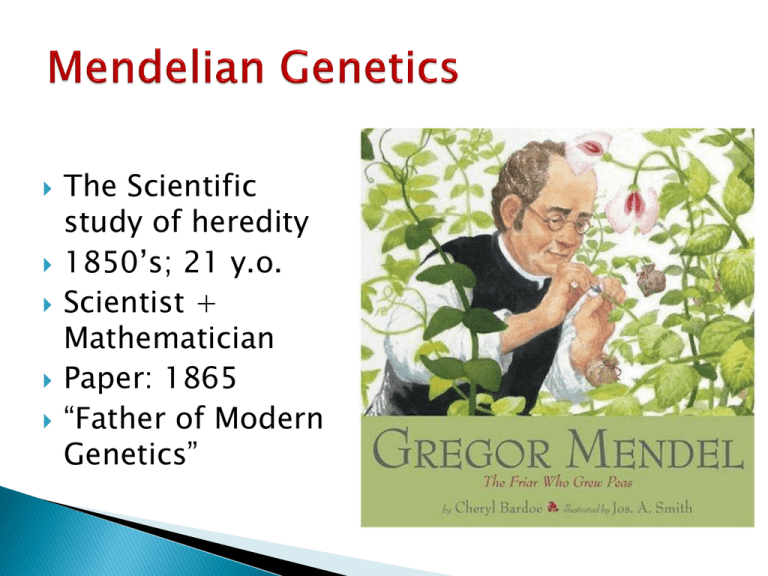
The Scientific
study of heredity
1850’s; 21 y.o.
Scientist +
Mathematician
Paper: 1865
“Father of Modern
Genetics”
Easy to grow
Matures quickly
Produces
generations quickly
Large # offspring
Cross and self
pollination
*Each trait on a
separate gene
Self Pollination: has both
male and female parts
Removal of Stamens
Transfer of pollen from
a white flower to the
purple stigma
(P1- parents)
Carpel/peapod/seeds
Plant the seeds
(F1- First Generation)
First Filial
Parent generation = P
Offspring of P generation = F1
Offspring of F1 generation = F2
Cross a homozygous dominant Tall flower
with a homozygous recessive short flower.
Give the F1 genotype and phenotype percents.
Tall = TT, short = tt
Phenotype – the physical appearance
of an organism. Determined by it’s
alleles (maternal/paternal) “Photo”
Genotype – the genetic makeup of an
organism “Genes”
The many different alleles that an
organism can possess: BB, Bb or bb
(Often use the 1st letter of the
dominant trait)
Homozygous
– an individual who has
the same alleles for a trait.
Ex. 2 genes for cystic fibrosis
(CC = homozygous dominant or
cc = homozygous recessive)
Heterozygous
– an individual who
has different alleles for a trait. Ex.
One gene for cystic fibrosis, one for
normal (Cc)
Results
Statistics/Ratios
Conclusions
◦ Dominant/Recessive
4 Principles
Notesheet
A trait is controlled by factors
(genes) that occur in pairs
One gene in a pair can mask or hide the
expression of the other gene
(dominant vs recessive)
Dominant allele: When only ONE of the
alleles affects the trait.
(Use a CAPITAL letter)
Recessive allele: the allele that is NOT
expressed if there is a dominant allele
present. (Use a small letter).
A pair of genes (alleles) separate
during the formation of sex cells
(gametes)
(Later learned that gametes are formed
during meiosis…come together later to
supply the alleles that form a trait)
The inheritance of one gene does not
affect or depend on the inheritance of
another gene
*Mendel was looking at traits on
different chromosomes…..
*Modification: Linked genes are
inherited together on a chromosome)
**EXCEPTION: crossing over.
Handout: DOMINANT vs RECESSIVE
Dark Hair
Nonred hair
Dark Skin
Skin Pigment
Brown eyes
Near or far sighted
Astigmatism
Normal Hearing
Genetics Online Practice Problems
Phenotype:
%
%
Ratio:
Genotype:
% Hom. Dom.
% Het. Dom.
% Hom. Rec.
More Online Genetics Problems
HW:
#1-5,7
Ratio:
*HW: Key, Cross, Punnett, Answer
Neither gene dominates
Blending of traits
Notation: 2 different Capitol Letters
Example: White Flowers x Red Flowers
produce PINK flowers
WW x RR = RW
white red
pink
(HW #8-9)
BOTH
genes are expressed
Notation: 2 different Capitol
Letters
Example: “ROAN” cows/horses
White/Red hair dispersed evenly
…looks pink
(HW #7)
Genes on the X chromosome
Usually recessive; different chances male/female
Ex: Color-blindness, hemophilia
NOTATION:
How males and females inherit:
X Y = Normal vision male
Xc Y = Color blind male*More in males-50/50
X X = Normal vision female
X Xc = Female color blind carrier
Xc Xc = Color blind female
(or written with hashmarks X ’ X ’)
males get their X from their mother
fathers pass their X to daughters only
females express the trait only if they get a copy
from both parents.
recessive in females; females can be ‘carriers’
ALWAYS expressed in males if present; can
NEVER be carriers of X-linked traits
Sex-Linked Inheritance Problem Sets
(#20-24)
Key:
Cross:
White eyed fruit flies
are the result of an Xlinked recessive gene.
Show the results from
a cross between a
red-eyed male and a
white-eyed female
Drosophila.
Indicate the results of
each sex separately
for genotype and
phenotype.
*Phenotype:
or
XR Y x XrXr
X Y x X’X’
Answer
“Carrier Females” are considered “Unaffected/Normal”
There are more than 2 alleles in the gene
pool BUT an individual inherits only TWO
(one allele from mom, and one from dad)
When there are 4 or more possible
phenotypes for a particular trait.
Example: Blood Typing: Inherited A,B,O
Six GENOTYPE possibilities ??
= FOUR different bloodtypes: ??
(#10-12)
3 different possible alleles for the blood type gene:
Co-dominant A or B, or recessive O
4 possible
Phenotypes: Genotypes:
Type A
IAIA, IAIi
(AA,AO)
Type B
IBIB, IBIi
(BB,BO)
Type AB
IAIB
(AB)
Type O
I i Ii
(OO)
(#10-12)
If a type O person
marries a type AB
person, what blood
type could occur in
their children?
Remember, type O
is recessive to both
A and B
(#10-12)
Key
Cross
Answer
i i x I AI B
DiHybrid Cross:
Independent Assortment
1. Determine all possible
combinations of alleles in
the gametes for each
parent.
(#13-19)
(#13-19)
Mendelian Cross:
In Pea Plants, the
flower color Purple is
dominant to white.
If two heterozygous
plants are crossed,
what % of the offspring
will be white?
Rules of Multiplication n and
Addition 10.35
PROBABILITY: Same set-up:
what is the probability that the
offspring will be homozygous
recessive?
Probability that an egg from
the F1 (Pp) will receive
a p allele = 1/2.
Probability that a sperm from
the F1 will receive a p allele =
1/2.
The overall probability that two
recessive alleles will unite, one
from the egg and one from
the sperm, simultaneously, at
fertilization is: 1/2 X 1/2 =
1/4.
Pedigree charts follow a genetic
mutation/disease through several
generations of a family.
You can determine what chance offspring has
of having a disease based on family history
and Punnett Square.
The main diseases that are tracked this way
are:
◦
◦
◦
◦
◦
Tay-sachs
Huntingtons
Colorblindness
Hemophilia
Cystic fibrosis
Autosomal Recessive (nn)
*Back of
Problems
Autosomal Dominant (D_)
*Dominant =
Gray, Normal wings=
Bb Vv
Or
b+bvg+vg
Where + is dominant
+
• Calculating the frequency of crossing-over reveals the
linear order of linked genes on a chromosome.
• Total Recombinant/Total # Offspring X 100
•
= 11%
where 1% recombination = 1 map unit
So the loci are 11 map units apart on the
same chromosome (11 centimorgans)
The closer two genes are to each other,
the less likely crossing over will occur;
genes are linked.

